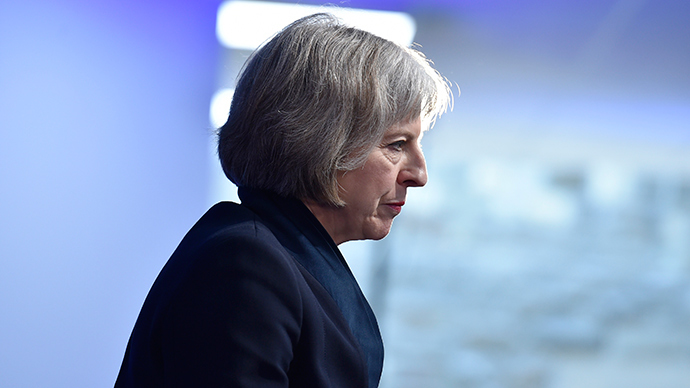State censorship: Tory minister slams Home Sec’s plan to sanitize UK TV shows

UK Home Secretary Theresa May has been accused of trying to introduce state censorship of TV broadcasters by a senior Conservative minister in a leaked letter.
Former Culture Secretary Sajid Javid wrote to Prime Minister David Cameron in March to express his opposition to May’s proposal to give British broadcast regulator Ofcom new censorship powers.
Javid, who was appointed Business Secretary after the election, said the Home Secretary’s plans represented a threat to freedom of speech in the UK.
May proposed to give Ofcom the power to vet television shows before they are broadcast, a plan Javid expressed strong opposition to.
READ MORE: ‘Underhand, undemocratic’: GCHQ continues controversial hacking after covert law change
READ MORE: New counter-extremism laws pledged in Queen’s Speech
READ MORE: ‘Broadest spying powers imaginable’: SNP MPs plan to block Tory Snoopers’ Charter
The contentious scheme was part of her extremism strategy ‘A Stronger Britain’, a policy which was prevented from being published before the election due to resistance from other senior Conservative cabinet ministers and the Liberal Democrats.
It is unknown whether May’s proposal to screen “pre-transmission” broadcasts made it into the final version of the strategy, the Guardian said on Thursday.
However, Downing Street said it will include measures to “strengthen the role of Ofcom to take action against channels which broadcast extremist content” in the Queen’s Speech, Cameron’s opening address to the new Parliament, next week.
In a frank letter to the PM dated March 11, Javid wrote: “Extending Ofcom’s powers to enable it to take pre-emptive action would move it from its current position as a post-transmission regulator into the role of censor.”----
“This would involve a fundamental shift in the way UK broadcasting is regulated, away from the current framework which is designed to take appropriate account of the right to freedom of expression.”
Javid said the government must balance its responsibility to defend society with its duty to protect freedom of expression.
In a particularly biting remark, the former culture secretary said, “It should be noted that other countries with a pre-transmission regulatory regime are not known for their compliance with rights relating to freedom of expression and Government may not wish to be associated with such regimes.”
Javid also expressed concern about the “difficulty of defining extremism and the consequent likelihood of the Government being seen to be interfering with freedom of speech without sufficient justification.”-------------
The leaked letter, which was seen by the Guardian, will bolster opposition to government policies critics describe as authoritarian.
Shortly after gaining a majority in the election on May 7, Cameron pledged to give police new powers to prevent “harmful activities” of individuals who pose a “threat to the functioning of democracy.”
The new orders were originally blocked by the Liberal Democrats during the Coalition.
The Scottish National Party (SNP), now the third-largest party in the Commons, indicated it would block any attempt to resurrect the Draft Communications Bill dubbed the Snoopers’ Charter.
The Snoopers’ Charter would pave the way for internet and mobile phone firms to retain records of customers’ online browsing habits, use of social media, emails, text messaging and voice calls.
Speaking to the Telegraph last week, one SNP MP said: “We think the mass collection of data is wrong. There is a line beyond which it is unacceptable for civil liberties can be impinged.”












